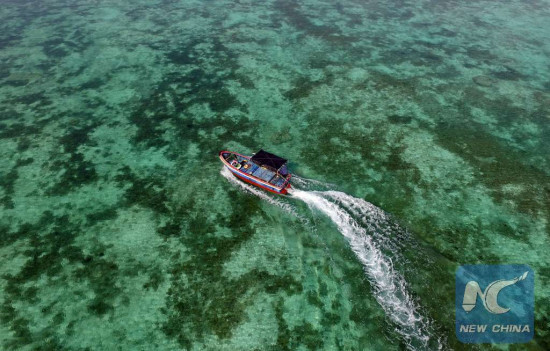
A boat moves on the sea near Zhaoshu Island of Qilianyu Islands in Sansha City, south China's Hainan Province, April 30, 2016. (Xinhua/Yang Guanyu)
Peaceful negotiation is the best solution to the disputes between China and the Philippines over the South China Sea, given the historical background and the complexity of the issue, said two former judges of the International Court of Justice (ICJ) on Monday.
The decision of an arbitral tribunal to allow a mandatory arbitration case unilaterally initiated by the Philippines will not help easing tensions in the region, according to Abdul G. Koroma, who served two terms as a judge at the ICJ.
"There is an obligation in international law, to resolve all disputes between states peacefully and you may achieve such an objective on the basis of negotiation, arbitration or judicial settlement. However, on such a complicated matter regarding so many littoral states along the South China Sea, and given the nature of the disputes, I think negotiation is the best method to solve such disputes," said Koroma.
Pemmaraju Sreenivasa Rao, former Chairman of the United Nations (UN) International Law Commission and former judge ad hoc at the ICJ, shared the same opinion.
"Negotiation is the only best method for this kind of disputes, particularly with so many difficult features coming from a long background and history," said Rao.
"I would rather have the parties sit together to discuss their common future to share, common resources to share, and common solutions to poverty and maritime environment," Rao added.
The two judges both took part in the third UN Conference on the Law of the Sea from 1973 to 1982, which led to the adoption of the UN Convention on the Law of the Sea (UNCLOS).
"It was our luck and privilege to have seen the great progress of negotiation to settle matters with different partners towards peace, security, development and cooperation," said Rao.
"It is written in the convention that disputes between two parties should be settled with peaceful means," he added.
"The concept of negotiation appears in the United Nations' Charter, and it also appears in the UNCLOS. It is not as if it is contrary to the law; it is also legal to negotiate, to find a peaceful solution to a dispute," said Koroma.
China has reiterated its stance of nonacceptance of and nonparticipation in the case, which is in line with international law according to the experts, as China has excluded territorial and delimitation disputes from mandatory arbitration in the reservations it made in agreeing to submit to the UNCLOS.
Koroma explained that it is up to the sovereignty of a state to decide whether it wants to embark on or initiate third-party processing or not, and a state has the right to reject an arbitration decision on the basis of international law if the jurisdiction is questionable.
Rao added that there's a lot of room for parties in the convention,therefore "I don't think the tribunal can foreclose any of these options."
The former judges also drew attention to the people living in the region, urging relevant parties to put the interests of the people at first.
"Eventually all the littoral states have to live together; the people have to live together. You have to find a method of settlement that you can live with," Koroma said. "Negotiation will certainly give the best result possible."


















































